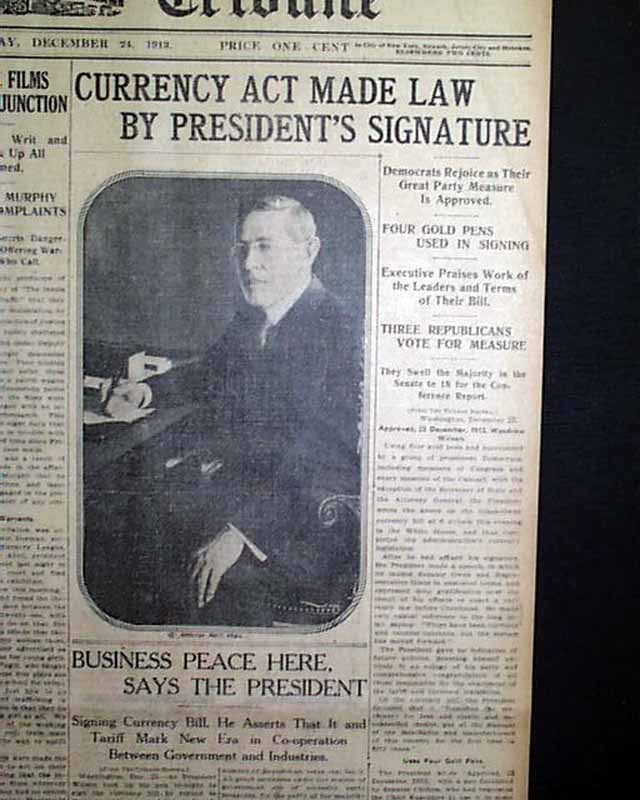The early 20th century was a time of immense economic transformation and turmoil in the United States. Against this backdrop, President Woodrow Wilson and his close advisor, Colonel Edward Mandell House, played pivotal roles in the creation of the Federal Reserve System. Their efforts aimed to stabilise the American economy, but the long-term consequences have been subjects of both scrutiny and regret.

Edward Mandell House: The Shadowy Influencer
Colonel Edward Mandell House was a key figure in President Woodrow Wilson’s administration, wielding significant influence behind the scenes. Though House’s specific quote about registering “biological property” in a national system lacks verification and reads more like modern conspiracy rhetoric than historical fact, his influence on Wilson and the policies of the era is undeniable.
House’s involvement in the creation of the Federal Reserve was crucial. He, along with other influential figures, envisioned a central banking system that could manage economic cycles and prevent the financial panics that plagued the late 19th and early 20th centuries. However, the concentration of economic power that followed was something House and his contemporaries might not have fully anticipated.
Woodrow Wilson’s Regret: A Government by the Few
Wilson, a progressive leader, believed in reforming the economic system to make it fairer and more stable. The Federal Reserve Act of 1913, which he championed, aimed to create a decentralized central bank system that would prevent financial crises and democratise credit. Despite these intentions, Wilson later expressed profound regret about the concentration of power that ensued.
In a telling quote, Wilson lamented:
“A great industrial nation is controlled by its system of credit. Our system of credit is concentrated. The growth of the nation, therefore, and all our activities are in the hands of a few men… We have come to be one of the worst ruled, one of the most completely controlled and dominated governments in the civilized world—no longer a government by free opinion, no longer a government by conviction and the vote of the majority, but a government by the opinion and duress of small groups of dominant men.”
This reflection highlights Wilson’s disillusionment with the economic system that emerged post-Federal Reserve. The very reforms intended to democratize finance ended up entrenching the power of a few elite bankers.
The “Few Men” and Their Influence
Wilson’s reference to the “few men” points to the powerful bankers and financiers who held disproportionate control over the economy. Key figures included:
- J.P. Morgan: His firm, J.P. Morgan & Co., was a titan in banking and corporate finance, influencing vast swaths of the economy.
- John D. Rockefeller: Through Standard Oil, Rockefeller dominated the oil industry, representing the kind of monopolistic power Wilson aimed to dismantle.
- Andrew Mellon: Mellon, an influential banker and later Secretary of the Treasury, exemplified the intersection of financial and political power.
These individuals and their institutions controlled the flow of credit and investment, shaping the economic landscape to their advantage. Their influence extended into politics, often swaying policy decisions to favour their interests.
The Federal Reserve: Stabilizer and Concentrator
The Federal Reserve was supposedly created to manage monetary policy, control inflation, and stabilise the banking system. However, its structure allowed significant influence from private banks. While the Fed’s policies have helped prevent economic catastrophes, they have also contributed to the concentration of financial power.
The 2008 financial crisis and subsequent bailouts exemplified this dynamic. The crisis underscored the Fed’s role in stabilising the economy but also highlighted the enduring power of large financial institutions. Critics argue that policies like quantitative easing disproportionately benefit the wealthy, further entrenching economic inequality.
Modern Implications: Trust and Fiat Currency
Today, the value of the dollar, like other fiat currencies, is based on trust. Since President Nixon ended the gold standard in 1971, the dollar’s value has not been tied to a physical commodity but rather to the trust in the U.S. government’s stability and economic strength. This trust underpins the dollar’s role as the global reserve currency and its widespread acceptance in international trade.
However, the concentration of financial power remains a concern. The “too big to fail” banks and major investment firms like BlackRock and Vanguard wield substantial influence over the economy. This concentration echoes Wilson’s fears about a government controlled by a small elite rather than by democratic processes.
Conclusion
Woodrow Wilson’s journey from advocating for the Federal Reserve to expressing deep regret about its consequences underscores a fundamental tension in economic governance. While debatable if the Federal Reserve has played a critical role in stabilising the economy, it has contributed to the concentration of financial power among a few elite individuals and institutions. This concentration challenges democratic ideals and highlights the ongoing struggle to balance economic stability with equitable power distribution.
The legacy of Wilson, House, and the Federal Reserve is a complex one, reflecting the intricate interplay between policy intentions and economic realities. It serves as a reminder of the profound impact that trust and confidence in financial systems have on the value and functioning of modern economies.
To keep up to date on our Newsfeeds or joining our community please Subscribe below or Contact Us mailto:info@solutionsyouneed.co.uk today.
